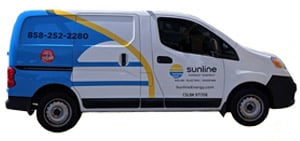Most people tend to be cost-conscious. A few of the more enlightened among us are value-conscious.
But when it comes to solar energy, we encourage our customers to become ROI-conscious. This is because the solar payback period of your installation is the single most important decision-making factor.
For many, this concept is counterintuitive.
Even with falling panel prices and tons of great incentives, going solar is still a big commitment. And it’s difficult to focus on anything other than solar installation cost – especially in the here and now.
But a well-installed system lasts a minimum of 25 years. And some last for 40 years or longer. So there is a lot of benefit to focusing on the long-term.
What’s the Difference between Solar Payback Period and Installation Cost?
Solar installation cost is what you pay upfront to put panels on your rooftop. And in the San Diego region, the average cost of a new PV installation varies considerably, depending on how you decide to pay for your system:
- With a solar lease, it’s possible to receive a new system for $0. If you’re focused on cost, this is obviously the cheapest way to go solar.
- If you use cash or a solar loan, the average price is about $10,000. This is clearly the more expensive option.
Regardless of how you finance your system, you’ll enjoy monthly utility bill savings – starting on Day 1.
However, if you finance your system with cash or a solar loan, you can use these monthly savings to pay yourself (or the bank) back over time. Most customers find that it takes about 4 or 6 years for their utility bill savings to exceed the money they paid or borrowed upfront. This is the solar payback period. And once you pass that period, you enjoy years and years of free electricity.
By contrast, a solar lease doesn’t have a payback period. Ever.
For the 15 to 20 years of your solar leasing contract, you’ll be required to make regular payments to the lessor – no matter what. Solar leasing is definitely the cheaper option upfront, but it ends up being way more expensive in the long run.
Always Remember That Solar Is an Investment – Not a Cost
We’ve said it before many times, but going solar is an investment and not a cost. It’s like education, health care, or Wall Street – but with much better returns and a lot less risk.
This doesn’t mean that cost isn’t important. But when shopping around for solar PV systems, your primary focus should be on whichever parts, labor, and financing offer the shortest possible payback period.
To learn how Sunline Energy consistently beats the industry average for payback periods, contact us today for a free solar quote and consultation. You pay absolutely nothing to begin exploring your solar options.

